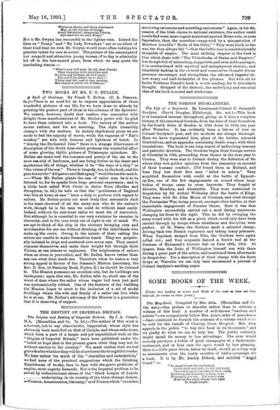THE GORDON HIGHLANDERS.
The Life of a Regiment. By Lieutenant-Colonel C. Greenhill Gardyne. (David Douglas, Edinburgh. 28s. net.)—This book is of sustained interest throughout, giving as it does a complete history of the renowned Gordons, from the time of their formation by the fourth Duke of Gordon in 1794 down to 1816, the year after Waterloo. It has evidently been a labour of love on Colonel Gardyne's part, and his methods are always thorough. Here we have regimental lists, plans of the battles, coloured illustrations, and an appendix containing Gaelic songs, with their translations. The book is one long record of unflinching bravery and patriotic devotion. The Gordons began their foreign service at Gibraltar in 1794, proceeding from thence in the next year to Corsica. They were sent to Ireland during the Rebellion of '98, where they won golden opinions from the peasantry on e.ccourt of their humane conduct; 1799 found them in Holland, and here they lost their first man "killed in action." They acquitted themselves with credit at the battle of Egmont- op-Zee, one of the few engagements on record where large bodies of troops came to cross bayonets. They fought at Aboukir. Mindoro, and Alexandria. They were mentioned in despatches by Sir Arthur Wellesley after the battle of Kioge. They were with Sir John Moore at Corunna, and went through the Peninsular War, being present, amongst other battles, at that remarkable engagement of Fuentes Onoro. Here it was that Wellington successfully carried out a most daring manceuvre, changing his front to the right. This he did by swinging the army round with his left as a pivot, which could only have been carried through by troops whose steadiness and discipline were perfect. At St. Pierre the Gordons made a splendid charge, driving back two French regiments and taking many prisoners. When Napoleon escaped from Elba, the Gordons were again called out ; and four sergeants danced a Scotch reel at the Duchess of Richmond's historic ball on June 15th, 1815. At Quatre Bras the Duke of Wellington himself was with them during a great part of the action, and mentioned them afterwards in despatches. For a description of their charge with the Scots Greys at Waterloo we can only here recommend a perusal of Colonel Gardyne's exciting pages.






































 Previous page
Previous page